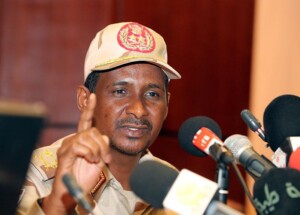Osman Mirghani: Sudan needs new political system to prevent ‘migration to the north’
About four million Sudanese live and work in Egypt. And many intend to follow. Up to at least eight daily flights depart from Khartoum International Airport with Sudanese leaving their country for good in search for a better life for their families in Egypt. Osman Mirghani, Editor-in-chief of the Sudanese El Tayyar newspaper, wrote in an opinion piece posted in Erem News about this “migration to the north”.
 Osman Mirghani, Editor-in-chief of the Sudanese El Tayyar newspaper (File photo)
Osman Mirghani, Editor-in-chief of the Sudanese El Tayyar newspaper (File photo)
About four million Sudanese live and work in Egypt. And many intend to follow. Up to at least eight daily flights depart from Khartoum International Airport with Sudanese leaving their country for good in search for a better life for their families in Egypt. Osman Mirghani, Editor-in-chief of the Sudanese El Tayyar newspaper, wrote in an opinion piece posted in Erem News about this “migration to the north”.
Since many years, Sudanese patients seek treatment in the Egyptian capital for treatment. It is better and cheaper than in their home country, they say. Those who cannot afford an air ticket, travel by bus along the Nile to the north. The number of buses at the Sudanese-Egyptian often exceeds 30, a traveller told Radio Dabanga early last year.
Yet, since the military coup of October 25 last year, people in Sudan, and in particular youth, have lost hope of a steady income and fear the future. Married men search for jobs in abroad as they cannot support their families anymore with their Sudanese salary. because of continuing high inflation. Those who do not find work in Saudi-Arabia and the Gulf, try their luck in Egypt.
Many students as well register at Egyptian universities as Sudanese universities are closed on-and-off, and have reportedly a lower level. And Sudanese who do have a good income, buy a second home in Cairo, “just in case, for when hell breaks loose in Sudan”.
“The political crisis in Sudan has completely paralysed the country. Most factories and projects are on the verge of bankruptcy. Even small companies have dried up like leaves in the dry season, but the greatest calamity is that there is no prospect of getting out of the tunnel, Osman Mirghani, Editor-in-chief of the Sudanese El Tayyar newspaper, wrote in an opinion piece, posted in United Arab Emirates-based Erem News earlier this month.
Following a “visit to ‘Secure Egypt’ as the famous poem of Sudanese Sheikh El Bur’i says”, Mirghani said he was shocked when he learned about the huge numbers of Sudanese living in Egypt “which reveal how far the Sudanese crisis has reached”.
'Migration to Egypt is no longer just an escape from a miserable economic situation in Sudan, but rather a search for a life that meets the standards of dignity' – Osman Mirghani
“No one knows the consequences of the rushing torrent of the Season of Migration to the North,” he states, referring to the famous novel written by Tayeb Salih.
Mirghani mentions that 22,000 Sudanese students are studying in Egyptian public universities. They pay “the same fees as the Egyptian students, all colleges are open to them without exception*.
“There are more than 110 Sudanese schools to accommodate the increasing numbers of students who prefer to adhere to the Sudanese curriculum and courses, and last year more than 4.000 Sudanese students sat for the Sudanese Secondary School exams in Egypt. [..] “Migration to Egypt is no longer just an escape from a miserable economic situation in Sudan, but rather a search for a life that meets the standards of dignity.”
In an analysis of the current crisis in Sudan, the editor-in-chief blames in particular the country’s political parties. “It is not possible to rely on reforming the political behaviour of the parties in the near future, as they are still in their old delusion, unable to criticise themselves and review their biography and trajectory, thus reproducing old mistakes.
Therefore, the Sudanese political system should be restructured “so that it does not become dependent on the ruling political system, no matter how rational or flawed it may be. “This is not a new invention. Rather, it is what all stable and developed countries do, making what is for politics for politics and what for administration is for administration. [..] “The solution to this problem is contained in legislation that prevents political regimes from invading the civil service institution, so the political playing field becomes confined to the sovereign domain that expresses ‘authority’ and not ‘government’.
“Otherwise, the emigrants will not return, but others will follow,” the article concludes.
* In 2004, Egypt and Sudan signed the so-called the Four Freedoms Convention, allowing the free movement of citizens between both “brotherly countries”, as well as working and owning property with no special permit. Soon however, it became clear that Sudanese men still needed a visa to be able to cross the northern border. In 2018, the authorities in Cairo requested an amendment be made to some of the agreement's clauses, including officially restricting the entry of Sudanese to Egypt.











 and then
and then